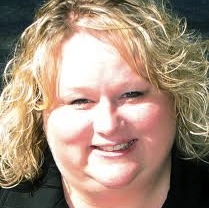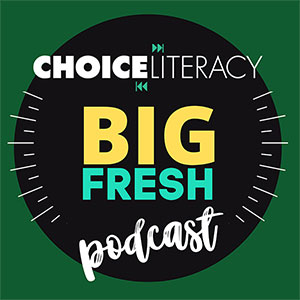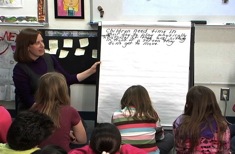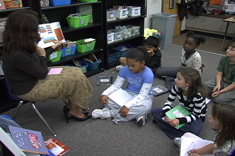Students who are identified as highly capable, gifted, and/or talented make special contributions to our classrooms. They also bring challenges, some of which are unexpected given their natural cognitive aptitude. And while many highly capable students’ gifts manifest themselves in writing, it seems that just as many struggle with the process in seemingly predictable ways; almost as if a remarkable strength must result in a related challenge in order to maintain the balance of the highly capable universe.
As I work with my own highly capable student writers, I do what any other teacher would do. I start with a baseline writing sample, score it against a grade-level rubric, and analyze the results to form a plan for instruction. Those who aren’t meeting standards or seem to be otherwise underperforming are given special consideration. But in doing so, I try to think about not only what is plaguing them and hindering progress, but also what motivates them as learners and writers.
Not everyone realizes how insecure highly capable students can be. They are well aware of their own limitations and some wallow in self-doubt when faced with this reality. I never want to discount the value my students have placed on a single element of writing performance, especially as it relates to their personality. I also don’t want to miss an opportunity to help writers grow during a key developmental phase of their education. Considering motivation allows me to build from their strengths and interests while protecting their vulnerabilities as learners.
Alan the Verbose
The first common personality, whom I’ll call “Alan,” is one who struggles with the ability to be concise and focused, in spite of strong verbal skills. Students like Alan appear to be very productive, and yet haven’t moved past the draft step of the process during our baseline assessment when others finished long ago. A peek over his shoulder reveals double-digit page numbers and a prideful grin. At some point in his writing career I suspect he was praised for the quantity of his writing and took it to heart. The finished product reveals a score of ineffective details and lost organization, not to mention a very fatigued writer!
In considering of Alan’s motivation to produce a well-detailed piece, I begin by praising the wealth of ideas, but not necessarily reinforcing the quantity. I help him prioritize ideas during prewriting; storing others for back-ups and even future pieces. I may even build in a temporary scaffold by saying, “What are the three most important ideas or events that we should include?” I know there will be at least four or five. My goal is to help Alan learn to be selective, write an effective conclusion, and move on to another one of his many, many ideas.
Bailey the Perfectionist
Perhaps the opposite of “Alan the Verbose” is “Bailey the Perfectionist,” who appears to dislike writing and experiences writer’s block most every writing period. “I don’t know what to write about,” or “I don’t know how to start,” she laments. Assuming a diagnosable learning disability is not the cause, I believe that Bailey is a concrete-sequential thinker who is motivated by an organized approach to learning. She seems hindered by her sense of perfectionism. I consider Bailey to be the most at-risk, because as her teacher, I know her writing needs to reflect a developmental process that requires risking imperfection. And Bailey isn’t a risk-taker.
Knowing Bailey is motivated by structure and predictability, I provide as much as possible. Graphic organizers help her prepare ideas without fully communicating them. I model my own imperfect draft writing to help her see the process in action. I may even scaffold the writing task, providing a topic sentence for Bailey to build upon, and serving as a scribe as she brainstorms ideas. This instructional strategy provides some immediate gratification for Bailey who is more accustomed to a blank paper and a ticking clock. I also make sure to give her specific, authentic praise to build her trust and understanding that some days will be less productive, and that’s okay.
Carolyn the Voice
A third highly capable personality I often encounter is one I find difficult to describe, but I know her when I see her. “Carolyn the Voice” is extremely imaginative, chooses reading material with sophisticated literary devices, and has no intention of allowing her status as an elementary school student to prevent her from emulating her chosen writing mentors. This reveals her primary motivation: whether writing a fictional story or brainstorming ideas for an essay, Carolyn’s purpose in writing is to entertain. Yet by focusing on style exclusively, she loses sight of the plot, main ideas, and other foundational aspects of writing.
To assist Carolyn, I use two separate strategies. First, I help her use the writer’s notebook to record clever ideas, even collecting short examples from mentor texts to mimic in a future piece. Second, I use some of the organizational scaffolds that benefit Alan and Bailey, especially starting with a possible conclusion in mind in order to stay on course through the piece. Since Carolyn understands abstraction, I compare organizing writing to building a house. We begin with the foundation, the walls, and the roof and only then are we ready to paint and choose curtains, which I equate to the creative touches that authors often save for the revision process. If appropriate, I may allow her to peer-coach a classmate struggling with the more stylistic elements of writing. Helping a peer can be empowering, and assures this writer that I value her creativity.
The Ongoing Challenge
Simply because I recognize the verbose, perfectionist, and over-voiced writers who pass through my classroom door each year doesn’t mean I can count on the same strategies and scaffolds to be effective. New students with similar struggles keep me on my toes as I strive to help them grow. Just as Alan is navigating his sea of ideas, in walks Danielle, whose intense focus on her preferred topic and/or form prevents her from mustering enthusiasm for any other. Or Eli, who brings his flash-finish style of writing to the fore as he races to be the first one done. And finally, there is Francesca, whose writing is already exactly what I would hope for. Suddenly I’m the one with nothing to so say as we confer.
Highly capable children, like all children, are complex individuals who challenge me as much as I work to challenge them. All I can do each year is ask myself what motivates each of my learners, and use that motivation as a vehicle, steering around the challenges and struggles down the road leading to success and confidence. So far, we’re all enjoying the ride.









